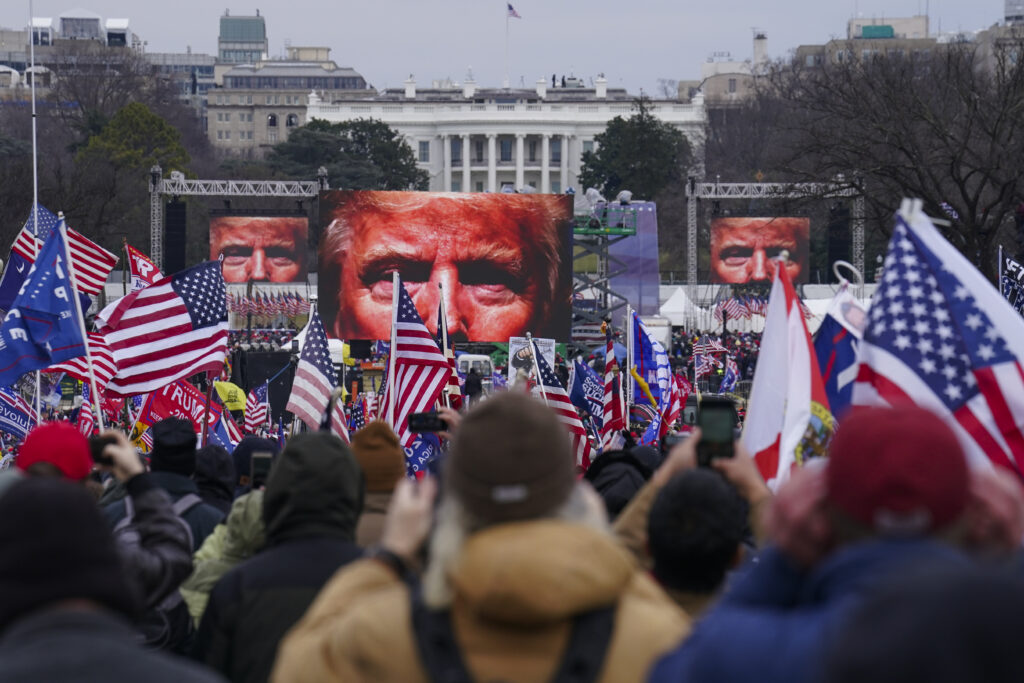Former President Donald Trump Is Not Immune From Prosecution in Election Subversion Case, D.C. Circuit Rules
WASHINGTON, D.C. — In a unanimous opinion issued this morning, a three-judge panel of the U.S. Circuit Court of Appeals for the D.C. Circuit affirmed that former President Donald Trump is not absolutely immune from criminal prosecution for “official acts” he undertook while serving as president.
The three-judge D.C. Circuit panel — composed of two Biden appointees and an H.W. Bush appointee — agreed with district court Judge Tanya Chutkan’s December 2023 decision denying Trump’s motion to dismiss his federal election subversion indictment on presidential immunity grounds.
Barring a pause of today’s decision, special counsel Jack Smith’s criminal case against Trump can proceed to the trial stage. Following the trial, a jury will ultimately rule on whether or not Trump is guilty of the crimes alleged in the indictment — all of which relate to his effort to overturn the results of the 2020 presidential election.

“For the purpose of this criminal case, former President Trump has become citizen Trump, with all of the defenses of any other criminal defendant. But any executive immunity that may have protected him while he served as President no longer protects him against this prosecution,” today’s opinion reads.
The panel rejected all three of Trump’s core arguments in support of his absolute immunity claims, including:
- That the court lacked the power to review his official actions under the separation of powers doctrine,
- That policy considerations grounded in separation of powers require immunity to avoid an intrusion on the executive branch and
- That the U.S. Constituion’s Impeachment Judgment Clause forbids criminal prosecution of a former president absent an impeachment and conviction by Congress.
In a rebuff of Trump’s contention that criminal liability for former presidents “risks chilling Presidential action while in office and opening the floodgates to meritless and harassing prosecution,” the panel today stated that “[i]t would be a striking paradox if the President, who alone is vested with the constitutional duty to ‘take Care that the Laws be faithfully executed,’ were the sole officer capable of defying those laws with impunity.”
Accepting Trump’s arguments “[a]t bottom…would collapse our system of separated powers by placing the President beyond the reach of all three Branches,” according to the opinion.
Toward the end of the 57-page opinion, the panel noted that Trump’s alleged efforts to overturn the 2020 election — if proven — would represent “an unprecedented assault on the structure of our government.” The opinion continued:
We cannot accept former President Trump’s claim that a President has unbounded authority to commit crimes that would neutralize the most fundamental check on executive power — the recognition and implementation of election results. Nor can we sanction his apparent contention that the Executive has carte blanche to violate the rights of individual citizens to vote and to have their votes count.
Just last week, Chutkan canceled the court’s previously scheduled March 4, 2024 date on which Trump’s election subversion jury trial was set to commence. Trump has until Monday, Feb. 12, to ask the U.S. Supreme Court to pause today’s decision and take up the case on the merits. If the Court rejects Trump’s motion to pause today’s decision, the case can resume in the district court and a new trial date could be set. As of now, it is unclear whether a trial will proceed prior to the 2024 election.
In a statement issued today, the Trump campaign already expressed its intent to appeal today’s decision. If Trump appeals to the Supreme Court, four out of the Court’s nine justices would need to agree to take up the case on the merits. And if Trump asks the Court to pause the D.C. Circuit’s decision, the votes of five justices are required to do so.
At the end of last year, the Supreme Court rejected the government’s request to bypass the D.C. Circuit and have the Court decide on the presidential immunity question immediately. With the case likely to once again end up before the Court in the coming weeks, the justices could ultimately decide on the constitutional question of whether the former president is absolutely immune from federal prosecution for alleged crimes committed while in office.
The Supreme Court has already agreed to take up a separate Trump case and will hold oral argument this Thursday to determine whether or not the former president can be disqualified from appearing on the ballot under Section 3 of the 14th Amendment.